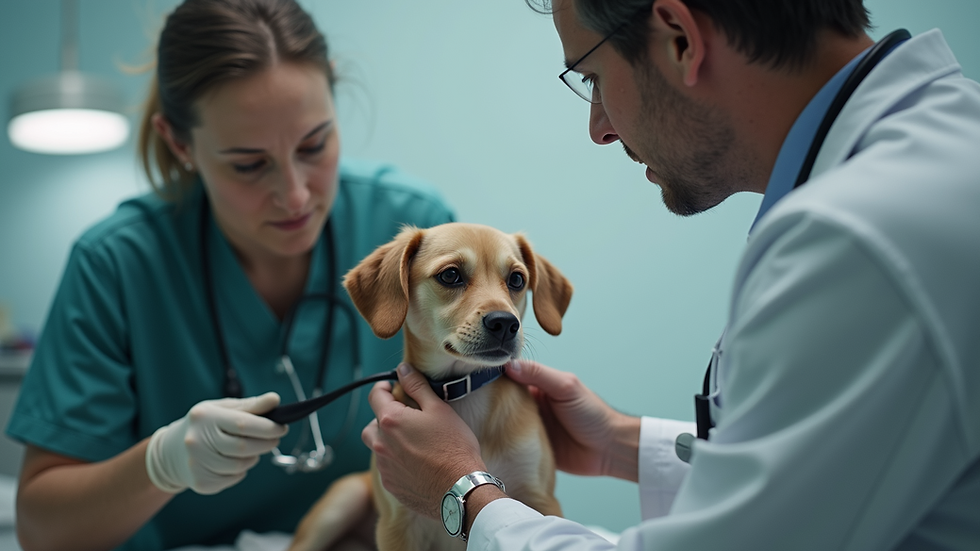Top Tips for Taking Care of Your Beloved Pets
- Arsalan Nazar
- Jul 22, 2025
- 4 min read
Owning a pet is a joyful experience, full of unconditional love and companionship. However, it also comes with responsibilities. Taking care of your furry friends involves more than just providing food and shelter. It requires attention, love, and proper knowledge to ensure their well-being. Here, we explore some essential pet care best practices to keep your pets healthy and happy.
Pet Care Best Practices
Start by choosing the right food for your pet. Each type of animal has unique nutritional needs. For instance, dogs might need high-protein diets, while cats require more protein and specific nutrients like taurine. Always read labels carefully and consult your veterinarian to figure out the best food options for your pet.
Additionally, feeding your pet the right portion is just as critical as the type of food. Many pet owners unknowingly overfeed their animals. Overweight pets can suffer from various health issues, including diabetes and heart disease. Use measuring cups and follow feeding guidelines provided on pet food labels.

Regular physical activity is another crucial aspect of pet care. Dogs need daily walks, while cats enjoy interactive playtime. Engaging them in physical activities not only helps maintain a healthy weight but also reduces behavioral problems caused by boredom. Daily exercise can greatly improve your pet's quality of life.
Regular Vet Visits
Frequent vet check-ups are essential for monitoring your pet's health. Vaccinations, dental care, and routine health screenings can prevent illnesses and catch any potential problems early. According to the American Veterinary Medical Association, regular check-ups increase the chances of early detection of diseases, leading to better treatment outcomes.
A good schedule usually involves annual visits for healthy pets, while older or ailing pets require more frequent visits. These check-ups can include physical exams, vaccinations, parasite control, and dental cleanings. Remember, it's always better to prevent issues than to deal with them when they become emergencies.

Grooming Essentials for Your Pet
Grooming is often overlooked in pet care, but it plays a significant role in maintaining your pet's overall health. Regular grooming eliminates dirt and loose hair and prevents matting in long-haired breeds. It also promotes healthy skin.
For dogs, you should brush their fur regularly, trim their nails, and clean their ears. Cats, on the other hand, may need less frequent grooming, but long-haired breeds require regular brushing and occasional baths. Some pets may also benefit from professional grooming sessions, especially if their breed's coat requires special handling.
Not to forget, dental care is crucial. Poor dental hygiene can lead to serious health issues. Brush your pet's teeth regularly and consider dental chews or toys that promote oral health.
Understanding Behavioral Needs
Understanding your pet's behavioral requirements is as important as their physical care. Pets thrive in environments where their needs for stimulation and companionship are met. Dogs are social animals, and they enjoy being part of a pack—whether that includes humans or other pets.
Consider providing toys that challenge their minds, like puzzle feeders for dogs or interactive playthings for cats. Behavioral training is also beneficial in preventing problems like aggression or anxiety. Invest time in socializing your pet with other animals and human beings to enhance their social skills.

Safety Measures and Environment
Creating a safe environment for your pets is critical. Make sure that your home is pet-proofed. Store chemicals, medicines, and hazardous materials out of reach. Smaller pets like cats or dogs can easily access places where dangerous items are kept.
Outdoor safety is just as important. Install fences to keep your pets contained in your yard, and consider using leashes or harnesses whenever you're out for a walk. If you're planning a trip, ensure pet-friendly accommodations or inquire about pet care services in your area.
Lastly, consider getting your pet microchipped. According to the American Humane Association, microchipping increases the chances of lost pets being returned home by 52%. It's a simple procedure that can provide peace of mind.
Enriching Your Pet's Life
Consider the emotional needs of your pet. Like humans, pets experience emotional well-being as well. Provide a stimulation-rich environment by incorporating interactive toys, engaging in daily activities, and fostering bonds through play.
Moreover, keep a routine. Pets thrive on routine and feel more comfortable when they know what to expect. Try to maintain consistent feeding times, exercise routines, and grooming schedules. A well-structured day can help reduce anxiety and behavioral issues.
Lastly, don’t forget to shower your pets with love and attention. Spending quality time with them reinforces your bond and makes them feel secure. After all, our beloved pets deserve all the love and care we can give. You can check more on pet care tips from all the best pets.
Commitment to Lifelong Care
Owning a pet is a long-term commitment that involves time, energy, and resources. Pets can live for many years, depending on the species. For instance, dogs can live up to 15 years, while some parrots can live for over 50 years. Therefore, when planning to adopt or purchase a pet, consider your long-term ability to care for them.
Prepare for their needs as they age. Older pets may require special diets or more frequent vet visits. Adjusting to these needs will help ensure that your pets live healthy, fulfilling lives.
Final Thoughts
Taking care of pets is a rewarding experience filled with joy and companionship. By following these best practices, you can create a nurturing environment for your beloved furry friends. Remember to provide proper nutrition, regular veterinary care, grooming, and love to make their lives happier and healthier. After all, the happiness of our pets often reflects the love and care we show them.




Comments